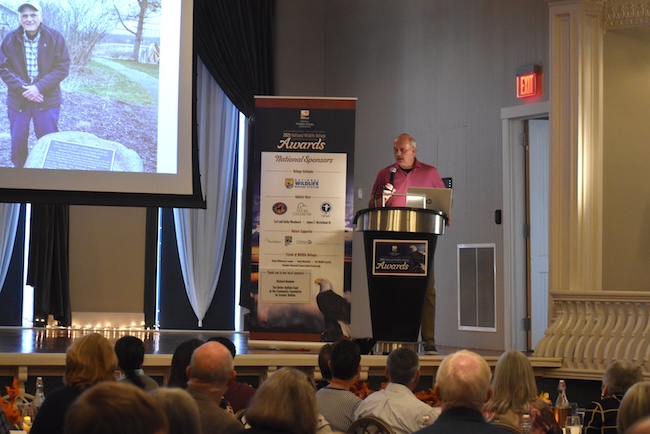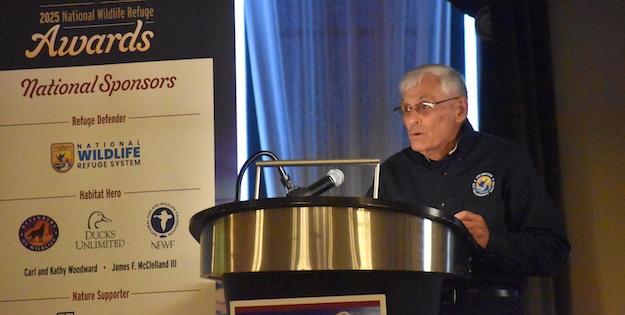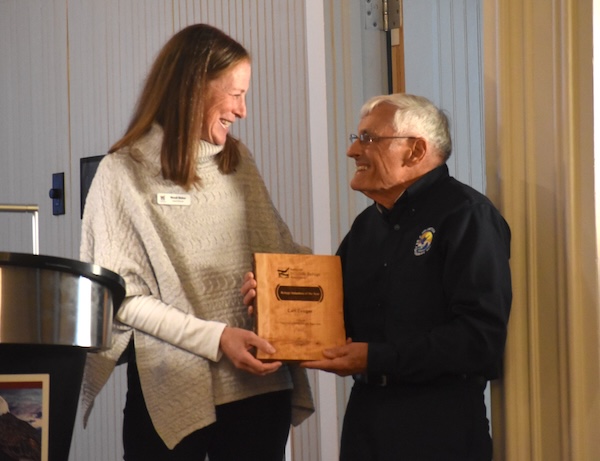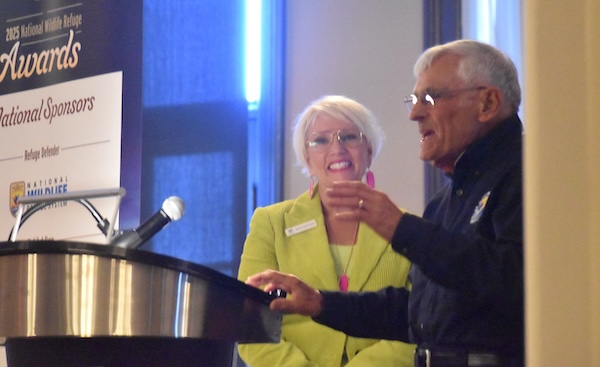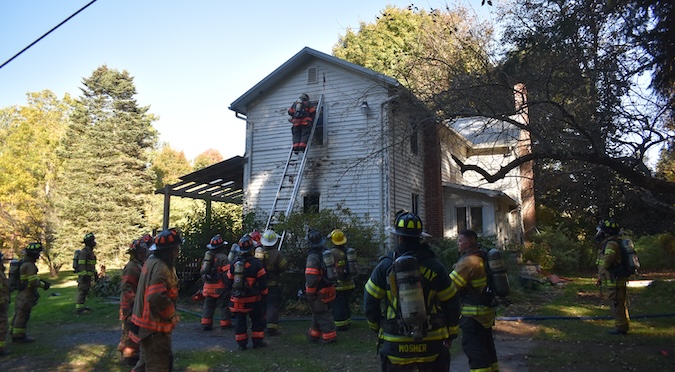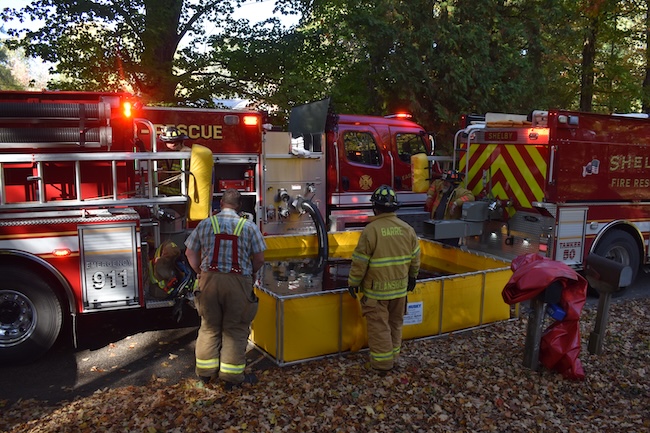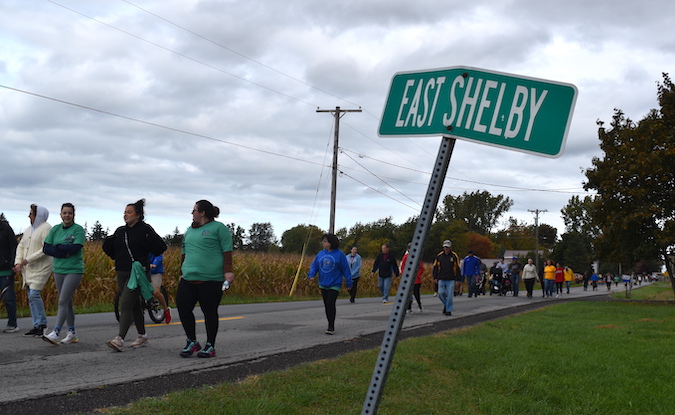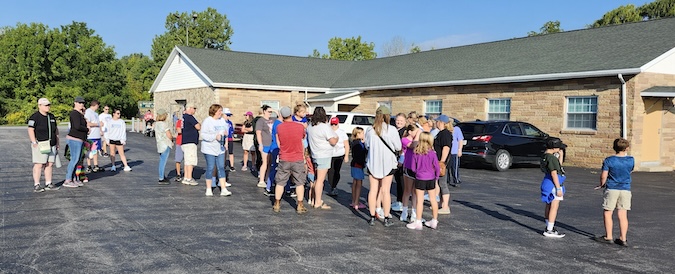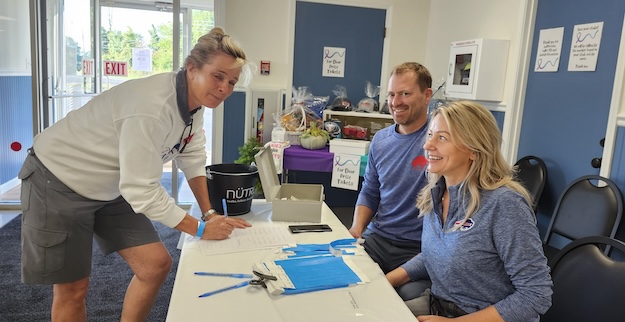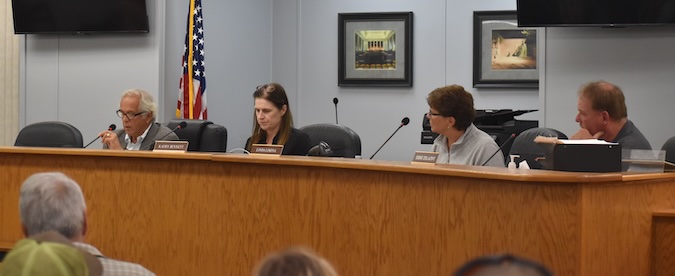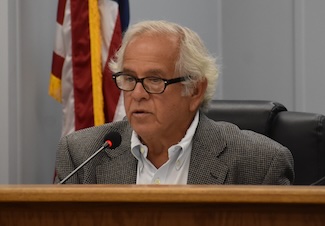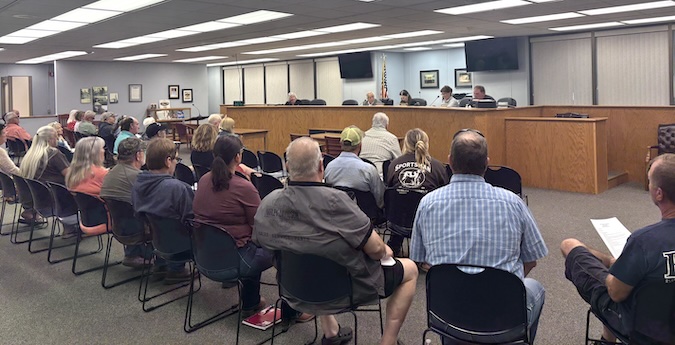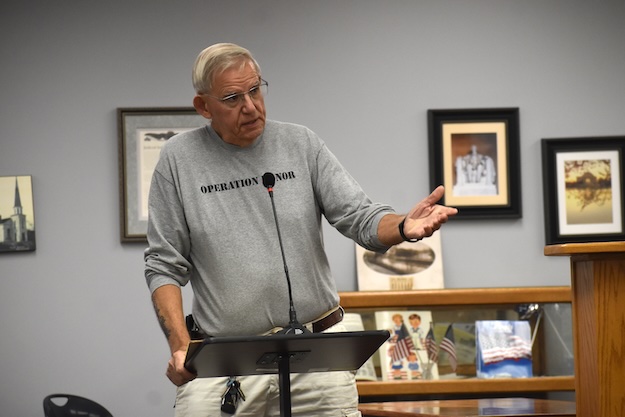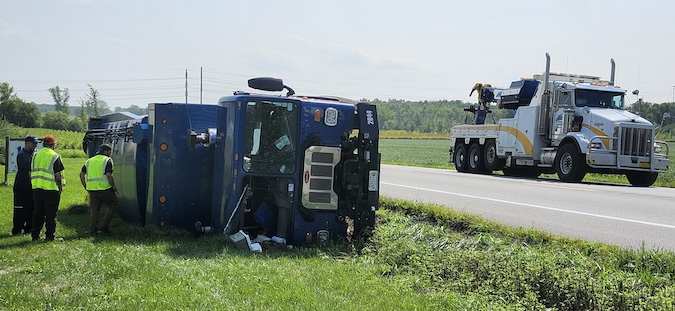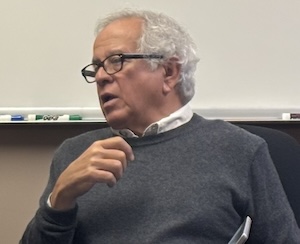Church in Shelby Center donated to Orleans County Christian School
OCCS expects to move to location to start next school year
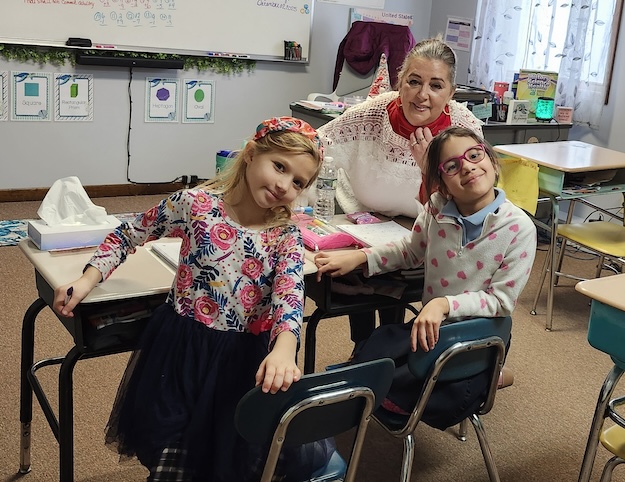
Photos by Ginny Kropf: Krista Lawson, standing, teaches all subjects to first-, second- and third-graders, in addition to teaching Bible and acting as school nurse at Orleans County Christian School. Two of her students are Zavina Wright, 7, and Isabella DeVore, 6. Lawson is the wife of Kevin Lawson, pastor of The Vine Church on Maple Ridge Road.

This is the former Shelby Baptist Church on Allegany Road in Shelby Center. The church, an adjoining cafeteria and a brick building have been donated to the Orleans County Christian School, which plans to start the 2026 school year there.
MEDINA – The Orleans County Christian School is about to make a monumental move, which they hope will propel them far into a successful future.
Now located in Alabama Full Gospel Fellowship Church on South Gravel Road, the church is planning a move to the former Shelby Baptist Church, which has been donated to the school.
“God has opened a remarkable door for OCCS,” said Dawn Zaidel, principal and acting administrator, in a press release last week. “A new building has been donated, positioning us for growth, sustainability and increased community impact.”
“OCCS already has a strong foundation and a rich legacy of faith,” said Ayesha Kreutz, who was recently hired as administrator. “Now we get to be part of the next chapter of this story, strengthening what God began and building toward the future He is preparing.”
The church/school complex in Shelby Center, formerly the Shelby Baptist Church, was donated to the Pastors’ Aligned for Community Transformation (PACT), which donated it to the Christian school.
Orleans County Christian School had its beginnings in October 1993, when the Rev. Tim Lindsay organized a steering committee of individuals with a heart for Christian education. Present were the Rev. Lindsay, Rev. David Vetter, Rev. Randy Anson, Rev. Chris Johnson, Curt Strickland, Curt Follman, Mark Irwin, Vanche Hedley and Dr. William Bellavia.
From that meeting, they sent a county-wide survey to see how much community interest there was. The steering committee continued to meet for three years until, in 1996, the Orleans County Christian School opened its doors on Sept. 4. It began with 13 students, one full-time teacher and one part-time teacher. The school was initially located at Harvest Christian Fellowship in Albion.
After five years, the school moved to Calvary Tabernacle Assembly of God in Medina’s old high school, where they were given use of the northeast wing of the first floor, along with the cafeteria, auditorium and gymnasium. After 17 years there, they were forced to move again when the building was sold, and Alabama Full Gospel Fellowship on Route 63 north of Shelby Center became their new home.
“Pastor Russ Peters and his congregation have welcomed us with open arms, but we are excited about our move once again to a new home,” Zaidel said. “We are also excited about the possibilities for growth at our new location. Orleans County Christian School’s purpose was, and still is, to provide young people with the tools and environment they need to attain the highest level of academic achievement and Christian character.”
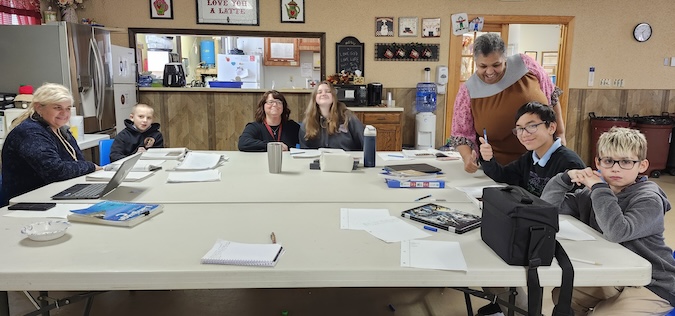
Students and teachers frequently gather in the Community Room at Orleans County Christian School. Here, from left, are Mary Hollenbeck, an all-around teacher, GED instructor or adviser on hybrid or distance learning; Dawn Zaidel, principal and English and history teacher; a 10th grade hybrid student; Ayesha Kreutz (standing), newly hired administrator; and students Levi, 13, and Jayden 11.
Zaidel said the school won’t be moving until next September. They have to convert the new church into a dual-purpose gymnasium and community center. The cafeteria is housed in the low wood building which connects the church and brick building on the north, which will house the classrooms.
“It is amazing when God pours out,” Zaidel said. “It’s never something small.”
Kreutz is excited about her new position and what she can bring to the school.
Her background is in classical Christian education, fundraising and organizational turnaround, which she is confident will help strengthen the school’s academics, expand student programs and build on the incredible foundation of this school’s history. As administrator, Kreutz will work as a consultant specializing in grant writing, program development and organizational strategy.
“I bring a blend of administrative leadership, curriculum development, community engagement, fundraising and long-range strategic planning,” Kreutz said. “We are on a mission to keep Christian education alive in Orleans County and investing in a legacy that will serve families for generations. I want to be part of raising up citizens with good character, who have a love of learning, family and community, and are prepared for life, wherever that might lead them. We need to invest in our youth so they will stay here and build this community, not just leave the first chance they get.”

Sophia Standish, standing, is working with Abigail Smith, a new student at the Orleans County Christian School.
The Orleans County Christian School is supported by Harvest Christian Fellowship, Albion; Calvary Tabernacle Assembly of God, Medina; Faith Alliance Church, Albion; First Baptist Church of Holley;
Oak Orchard Assembly of God and Alabama Full Gospel Fellowship, Medina; Light of Victory Church, Albion; and Faith Covenant Fellowship, Medina.
The parent of a former student shared this testimonial: “This is an awesome school that takes time for one- on-one learning and really cares about the kids. My daughter has gone there for almost 7 years.”
The Orleans County Christian School accepts children from pre-school through 12th grade. This is the first year for preschoolers and they are filled to their capacity of seven children.
Michael Zaidel, school nurse and member of the Christian school board, said most parents don’t realize they can get busing to and from our school if they live within 15 miles of the school. They currently have students registered from Royalton/Hartland, Albion, Holley, Oakfield, Lyndonville and Batavia. Several students are driven in by their parents, he said.
The school is also able to offer students participation in BOCES, and busing is provided, Dawn Zaidel said.

The school plans to use the brick building on the north for the classrooms. The church building is planned to become into a dual-purpose gymnasium and community center. The cafeteria will be housed in a low wood building which connects the church and brick building.
Kreutz said they are looking at additional opportunities for students at the school.
“The kids want to start a Club America,” Dawn said.
“It is student-run and encourages kids to develop different service projects in the community,” Kreutz said.
Dawn said when she was asked to fill in as administrator, the first thing she did was brainstorm on how they could get more students enrolled.
“We have gone from eight to 20 students,” she said. “Our capacity is 37. I am a firm believer if we can get a child from the beginning, he will stay. Our parents are overjoyed we are able to now accept preschoolers.”
The Orleans County Christian School depends heavily upon donations, and anyone wishing to donate to the school may make a one-time donation of any amount or pledge a monthly gift by logging on to www.orleanscountychristianschool.com; or mailing a check to OCCS, P.O. Box 349, Medina, 14103. Donations can also be made through Venmo:@occsschool.



















